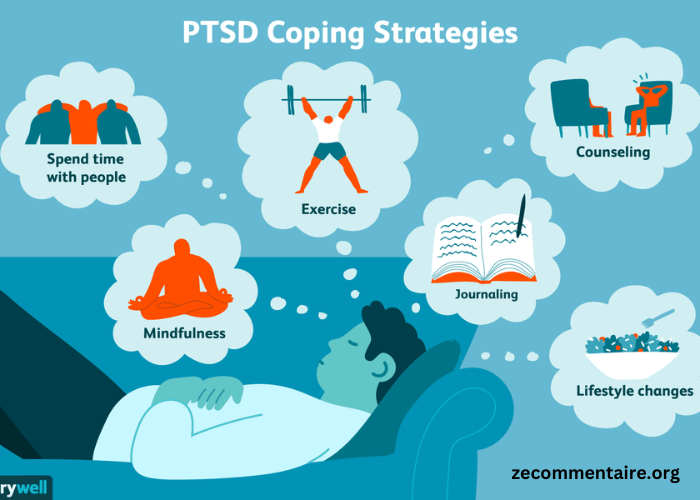PTSD can be debilitating. People suffering with the disorder often feel on edge, find it hard to concentrate, and express aggression, even at the people they love the most. This makes it very difficult to maintain relationships, succeed at work, and enjoy day-to-day activities.
Talk therapy along with certain physician-prescribed medications have proven to be effective in helping treat PTSD, but there are some things you can do at home, on your own, that can also make it easier to manage.
If you’re suffering from post-traumatic stress disorder, these seven self-care activities can provide PTSD relief and help you reclaim your life.
Practice Deep Breathing Techniques
When we feel fear and panic, we breathe rapid, shallow breaths. Rapid, shallow breaths can make us feel more fearful, so this can become a vicious cycle if you don’t know how to control it.
There are many benefits to learning deep breathing techniques, such as:
- Reduced stress hormones
- Lowered blood pressure and heart rate
- Increased sense of well-being
There are different types of deep breathing techniques that you can learn, so try to carve out at least 10 or 20 minutes a day to practice and perfect them.
Practice Mindfulness
Mindfulness means being fully present in the moment. For people with PTSD, this is key, as it’s not the present moment that’s frightening, it’s the memories of trauma from the past. Grounding yourself in the present helps to remind you that you are safe right now and makes it easier to combat flashbacks and intrusive thoughts.
Some people find it helpful to carry a physical object with them, an object that they can look at and know that they are in the present, where it’s safe. Others use grounding techniques such as speaking aloud a list of objects nearby or counting objects of a specific color.
Keep a Journal
With or without PTSD, journaling is an excellent form of self-care. Keeping a journal or writing down your thoughts in a daily diary is a great way to reduce stress as well as improve clarity and focus.
In addition to journaling about your current daily events and activities, try writing about past experiences. The more detail you can include, the more effective a healing tool this can be.
Make Time for Exercise
Exercising, particularly outside in the fresh air, is an excellent way to reduce stress and relieve feelings of PTSD. Running, biking, and lifting weights are all great stress-reducers, but even low-impact workouts, such as stretching or doing yoga, are also effective.
Regular exercise is a key element in every strong self-care routine. Exercise reduces stress hormones, boosts endorphins that help to improve mood, and improves your sleep habits, all of which can help you better manage PTSD.
Maintain a Healthy Diet
While a diet of salty, sweet, and fatty foods may seem comforting, it won’t help you relieve any of your stress. Practice self-care by eating healthy meals and consuming healthy beverages that naturally reduce stress, improve cognitive brain function, and boost your mood.
Here are some of the best stress-busting foods and beverages to incorporate into your diet:
- Dark chocolate
- Herbal teas
- Salmon, tuna, and other fatty fishes
- Nuts and seeds such as flaxseed and walnuts
- Fiber-rich foods, such as berries, beans, broccoli, and kale
- Whole grains and complex carbohydrates, such as oatmeal, brown rice, and buckwheat
Find Ways to Comfort Yourself
When battling PTSD, it’s important to do things that comfort you. Some people enjoy sleeping under a weighted blanket, while others find comfort in listening to their favorite music or spending time with a pet. Find something that makes you feel at ease and add it to your daily or weekly routine.
Some people suffering with PTSD find relief by using medical marijuana. In recent years, many states have legalized the use of medical cannabis for PTSD patients.
The “high” feeling associated with marijuana use makes some people apprehensive about trying it. If you don’t like the effect, there are products that can reduce the effects of THC on the brain and give you more control over the cannabis experience.
Take the Time to Understand Your Triggers
Your PTSD can be triggered by all sorts of things, including smells, sounds, places, and even certain words. Taking some “me time” to identify what those triggers are can help you avoid them in the future.
If you’re triggered by specific dates of the year or certain times of the day, dedicate those moments to practicing other measures of self-care, such as meditating, exercising, or journaling.
Conclusion
Living with PTSD can be challenging, but it can be managed with medication, talk therapy, and a smart self-care routine. If you’re suffering from this disorder, know that you’re not alone and make it a point to seek professional advice to help you get through it.
Living through traumatic events makes you a survivor, but dedicating time to self-care can put you in a position to thrive.





